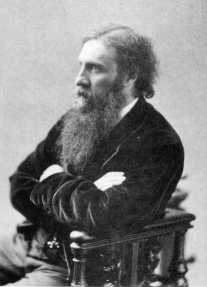
Criticism
(My complete GMD bio/commentary
is here).
Bibliography
George MacDonald is not generally regarded for the literary criticism in his works. For his most critical analysis of other authors we would've had to have listened to his many lectures firsthand, most of which were never written down. As is noted in the "USA Lecture Tour" section of this website, he had lectured both at home and abroad on such diverse topics as Robert Burns, Tom Hood, Tennyson, Milton, and Shakespeare along with discourses on English Literature and poetry in general.
Almost all of his recorded works of criticism can be found in A Dish of Orts, The Tragedie of Hamlet (with a study of the text of the Folio of 1623), and England's Antiphon. The latter work outlines the thought behind what he considered to be England's greatest religious poetry from its earliest forms to his own day. The Hamlet study we have covered in the Shakespeare section of this website. A Dish of Orts was a collection of MacDonald's views on a variety of subject matter. This would include two essays on Shakespeare, one on Robert Browning's poem "Christmas Eve", one on Wordsworth, and one on Shelley. Perhaps, however, his most interesting piece to us lies in his essay on the imagination called "The Imagination: Its Functions and Its Culture". It shows what great differences of opinion he would have had with many of those who belonged to the psychology profession from both his day and our own. They, always trying to prove states of consciousness initiated by the thinker himself, MacDonald offering a more common sense approach that questions why anyone should, would, or how they even could, instigate thoughts themselves:
If we now consider the so-called creative faculty in man, we shall find that in no primary sense is this faculty creative. Indeed, a man is rather being thought than thinking, when a new thought arises in his mind. He knew it not till he found it there, therefore he could not even have sent for it. He did not create it, else how could it be the surprise that it was when it arose? He may, indeed, in rare instances foresee that something is coming, and make ready the place for its birth; but that is the utmost relation of consciousness and will he can bear to the dawning idea. Leaving this aside, however, and turning to the embodiment or revelation of thought, we shall find that a man no more creates the forms by which he would reveal his thoughts, than he creates those thoughts themselves.
Also in Orts is an essay called, "A Sketch of Individual Development", which follows the growth of human self-consciousness in all its facets. It begins:
-
We cannot recall whence we came, nor tell how we began to be. We know approximately how far back we can remember, but have no idea how far back we may not have forgotten. Certainly we knew once much that we have forgotten now. My own earliest definable memory is of a great funeral of one of the Dukes of Gordon, when I was between two and three years of age. Surely my first knowledge was not of death. I must have known much and many things before, although that seems my earliest memory. As in what we foolishly call maturity, so in the dawn of consciousness, both before and after it has begun to be buttressed with self-consciousness, each succeeding consciousness dims--often obliterates--that which went before, and with regard to our past as well as our future, imagination and faith must step into the place vacated of knowledge. We are aware, and we know that we are aware, but when or how we began to be aware, is wrapt in a mist that deepens on the one side into deepest night, and on the other brightens into the full assurance of existence. Looking back we can but dream, looking forward we lose ourselves in speculation; but we may both speculate and dream, for all speculation is not false, and all dreaming is not of the unreal.
By degrees he has learned that the world is around, and not within him--that he is apart, and that is apart; from consciousness he passes to self-consciousness. This is a second birth, for now a higher life begins. When a man not only lives, but knows that he lives, then first the possibility of a real life commences. By real life, I mean life which has a share in its own existence.
For now, towards the world around him--the world that is not his mother, and, actively at least, neither loves him nor ministers to him, reveal themselves certain relations, initiated by fancies, desires, preferences, that arise within himself--reasonable or not matters little:--founded in reason, they can in no case be devoid of reason. Every object concerned in these relations presents itself to the man as lovely, desirable, good, or ugly, hateful, bad; and through these relations, obscure and imperfect, and to a being weighted with a strong faculty for mistake, begins to be revealed the existence and force of Being other and higher than his own, recognized as Will, and first of all in its opposition to his desires. Thereupon begins the strife without which there never was, and, I presume, never can be, any growth, any progress; and the first result is what I may call the third birth of the human being.